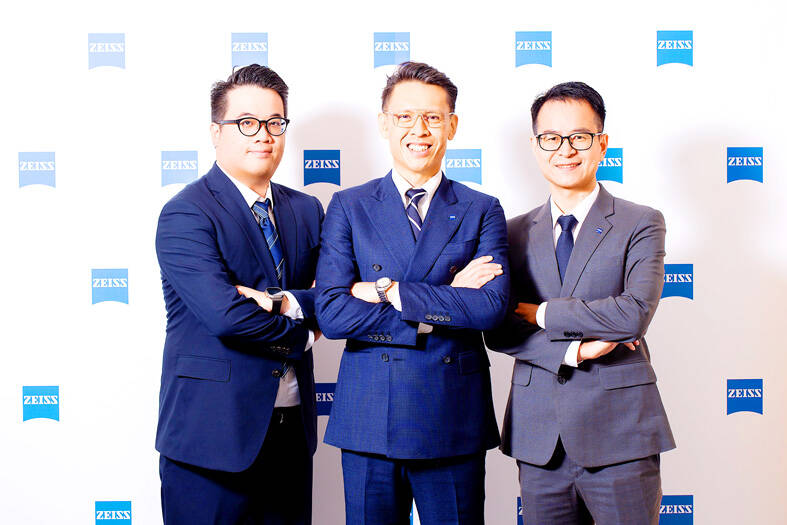Zeiss plans to unveil a new investment project next month at the Computex Taipei trade show, aiming to elevate Taiwan’s position as a global center for artificial intelligence (AI) technology, company executives said yesterday.
The investment would be the second leg of the German company’s 10-year plan to invest NT$10 billion (US$310.3 million) in Taiwan. Zeiss initiated the plan last year by launching a NT$300 million innovation center at the Hsinchu Science Park (新竹科學園區).
The new project would “significantly increase Taiwan’s research-and-development [R&D] capabilities,” Zeiss Taiwan head Cheong Peng Tat (章平達) said at a news briefing in Taipei.

Photo courtesy of Zeiss Taiwan
Zeiss aims to bring the world’s most advanced process technologies, AI solutions and resources to Taiwan, making the country an optimal location for international companies to undertake research and developments projects and establish new product introduction centers for AI products, said Clive Yen (嚴子登), head of Zeiss Taiwan’s industrial quality solutions unit.
Taiwan would evolve into a key AI technology hub, with failure analysis, process validation and all sorts of quality control measures to be carried out, he said.
The major technological challenges faced by AI supply chains lie in printed circuit boards, liquid-cooling systems and server rack assembly, due to increasing technological complexity and thermal management issues, he added.
Zeiss is set to showcase its new “Zeiss Metrotom,” an industrial computed tomography system for measuring and inspecting complete components made of plastic or light metal, at Computex, with a focus on AI server products, it said.
Aside from computed tomography solutions, Zeiss also saw increasing demand for its research microscopy solutions such as high-resolution 3D X-ray microscopy solutions to help customers conduct fault isolation, failure analysis and yield enhancement. The company’s microscopy solutions are used a variety of areas such as advanced chip-on-wafer-on-substrate (CoWoS) packaging technology, which is adopted to package AI chips.
Due to strong customer demand, Zeiss’s research microscopy solutions (RMS) business group has enjoyed more than 50 percent annual growth over the past three years, RMS head Henry Cai (蔡慧) said yesterday. He expects the growth momentum to carry into the next few years.
To cope with business expansion and rising demand for its equipment and services, the company plans to increase its local headcount by about 12 percent, or 50 new employees, this year, Cheong said.
Zeiss Taiwan’s workforce has grown rapidly, reaching 400 employees today, up from 40 in 2018, the company said.
Over the past five years, Zeiss Taiwan has expanded across five business units: consumer markets, medical technology, semiconductor manufacturing, microscope solutions and industrial quality solutions, it added.

NEW IDENTITY: Known for its software, India has expanded into hardware, with its semiconductor industry growing from US$38bn in 2023 to US$45bn to US$50bn India on Saturday inaugurated its first semiconductor assembly and test facility, a milestone in the government’s push to reduce dependence on foreign chipmakers and stake a claim in a sector dominated by China. Indian Prime Minister Narendra Modi opened US firm Micron Technology Inc’s semiconductor assembly, test and packaging unit in his home state of Gujarat, hailing the “dawn of a new era” for India’s technology ambitions. “When young Indians look back in the future, they will see this decade as the turning point in our tech future,” Modi told the event, which was broadcast on his YouTube channel. The plant would convert

‘SEISMIC SHIFT’: The researcher forecast there would be about 1.1 billion mobile shipments this year, down from 1.26 billion the prior year and erasing years of gains The global smartphone market is expected to contract 12.9 percent this year due to the unprecedented memorychip shortage, marking “a crisis like no other,” researcher International Data Corp (IDC) said. The new forecast, a dramatic revision down from earlier estimates, gives the latest accounting of the ongoing memory crunch that is affecting every corner of the electronics industry. The demand for advanced memory to power artificial intelligence (AI) tasks has drained global supply until well into next year and jeopardizes the business model of many smartphone makers. IDC forecast about 1.1 billion mobile shipments this year, down from 1.26 billion the prior

People stand in a Pokemon store in Tokyo on Thursday. One of the world highest-grossing franchises is celebrated its 30th anniversary yesterday.

Zimbabwe’s ban on raw lithium exports is forcing Chinese miners to rethink their strategy, speeding up plans to process the metal locally instead of shipping it to China’s vast rechargeable battery industry. The country is Africa’s largest lithium producer and has one of the world’s largest reserves, according to the US Geological Survey (USGS). Zimbabwe already banned the export of lithium ore in 2022 and last year announced it would halt exports of lithium concentrates from January next year. However, on Wednesday it imposed the ban with immediate effect, leaving unclear what the lithium mining sector would do in the